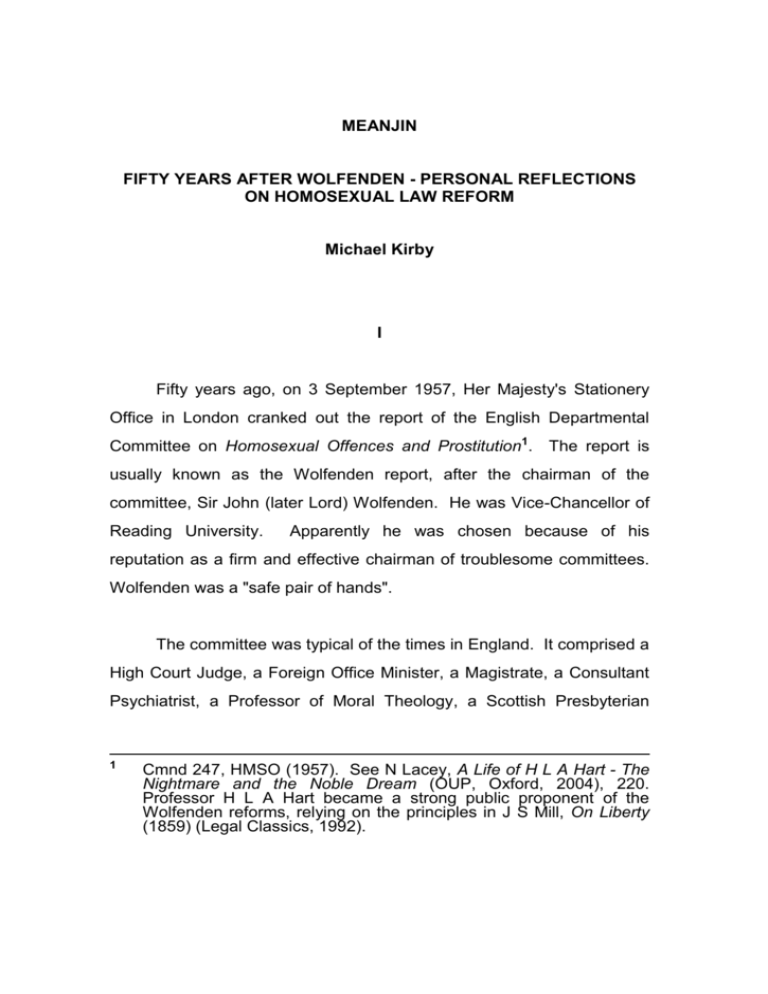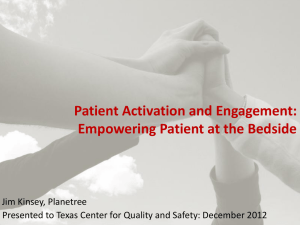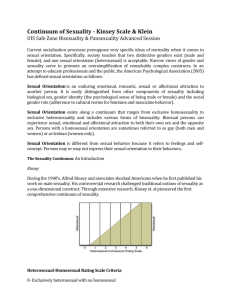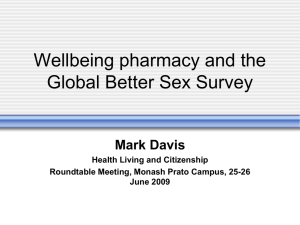
MEANJIN
FIFTY YEARS AFTER WOLFENDEN - PERSONAL REFLECTIONS
ON HOMOSEXUAL LAW REFORM
Michael Kirby
I
Fifty years ago, on 3 September 1957, Her Majesty's Stationery
Office in London cranked out the report of the English Departmental
Committee on Homosexual Offences and Prostitution1. The report is
usually known as the Wolfenden report, after the chairman of the
committee, Sir John (later Lord) Wolfenden. He was Vice-Chancellor of
Reading University.
Apparently he was chosen because of his
reputation as a firm and effective chairman of troublesome committees.
Wolfenden was a "safe pair of hands".
The committee was typical of the times in England. It comprised a
High Court Judge, a Foreign Office Minister, a Magistrate, a Consultant
Psychiatrist, a Professor of Moral Theology, a Scottish Presbyterian
1
Cmnd 247, HMSO (1957). See N Lacey, A Life of H L A Hart - The
Nightmare and the Noble Dream (OUP, Oxford, 2004), 220.
Professor H L A Hart became a strong public proponent of the
Wolfenden reforms, relying on the principles in J S Mill, On Liberty
(1859) (Legal Classics, 1992).
2.
Minister and the Vice-President of the Glasgow Girl Guides.
This
diverse collection of the great and good first convened in 1954. In fact,
establishment of the committee was probably the direct result of an
article, "Law and Hypocrisy" published in the Sunday Times in March
1954.
That article castigated the outcome of the trial of Edward
Montagu, the 3rd Baron Montagu of Beaulieu and two other young men
convicted of acts of sexual indecency with each other. Except that a
Lord was involved it is doubtful that the case would have been noticed.
Whilst the Sunday Times and other journals were critical of the
conduct of police in the trial of the noble Lord, some politicians and
churchmen called for firm action to curb the spread of the "detestable
vice". Medical researchers at the time described homosexuality as a
severe mental sickness. Most observers of the British Establishment
probably expected that the Wolfenden inquiry would touch lightly on its
unpleasant subject matter and propose toughening the laws on the
subject, or at least holding the line.
In the result, however, almost unanimously, the committee
recommended that "homosexual behaviour between consenting adults
in private should no longer be a criminal offence".
Specifically, the
committee found that "homosexuality cannot legitimately be regarded as
a disease, because in many cases it is the only symptom and is
compatible with full mental health in other respects". At the heart of the
recommendations of Wolfenden and his motley band of colleagues was
3.
an idea about the limits of the law in enforcing personal morality, in a
free and modern society2:
"[U]nless a deliberate attempt is to be made by a society,
acting through the agency of the law, to equate the sphere
of crime with that of sin, there must remain a realm of private
morality and immorality which is, in brief and crude terms,
not the law's business".
II
The enactment of criminal offences against homosexuals in
English law dated to 1533. It was in that year that the Parliament of
Henry VIII first made "buggery" a felony, punishable by hanging3. Some
unkind historians have suggested that this law was introduced as an
aspect of Henry's great dispute with the Church and in furtherance of his
Majesty's design to get hold of the great wealth of the monasteries
where the new offence could so easily be alleged so as to strike terror in
the hearts of the accused religious. Henry's law was soon repealed
during the reign of his most Catholic daughter Mary.
The law was revived by Elizabeth, Parliament complaining that
Mary's repeal had emboldened "evil disposed persons" to commit "the
2
Ibid. See A Grey, Quest for Justice - Towards Homosexual
Emancipation, Sinclair-Stevenson, London, 1992, 23.
3
L Crompton, Homosexuality & Civilisation, Harvard Uni Press,
Cambridge, 2002, 362.
4.
said most horrible and detestable Vice".
The ensuing language of
statutory calumny survived in England until ten years after the
Wolfenden report.
Then, in the reign of the second Elizabeth, the
"abominable", "detestable", "unnatural" crime, which was "so horrible as
not to be spoken of amongst Christian people", finally departed the
English statute book4. What the codifier William Blackstone had extolled
in his Commentaries on the Laws of England and what the philosopher
Jeremy Bentham had mocked in his essay on legal reform, Wolfenden
and his committee finally put to rest in England.
Bentham's most distinguished disciple, John Stuart Mill, had
propounded a general principle of law-making that found practical
expression in the Wolfenden report. Actions that were 'self-regarding'
were not the law's business. Only actions that were 'other-regarding'
justified legal prescription, particularly of the criminal kind. Actions did
not become 'other-regarding' merely because they upset sensitive souls
in society. The criminal law, with its heavy-handed punishments, stigma
and shame, was not to be deployed on the basis only of scriptural texts
and private sensibilities.
Wolfenden & Co began a very important
movement in the law of English-speaking countries to claw back the
overreach of criminal law. The Wolfenden report triggered a movement
of law reform that led to reforming legislation in England; then in
Scotland; belatedly in Northern Ireland; in Canada, parts of the United
4
Peccatum illud horribile, inter christianos non nominandum.
Blackstone, 4: 125-126 in Crompton, 529.
5.
States of America; New Zealand and, drip by slow drip, in the States of
Australia beginning with Don Dunstan's reform in South Australia in
1975.
III
It is probably hard for younger people today to remember the
atmosphere of the years before the Wolfenden reforms were enacted. I
can remember them. They were years of fear, fright and stigma. Hardly
a week went by without the afternoon newspapers screaming their
banner headline about "perverts" being arrested.
Famous visitors to
Australia, like the great Chilean pianist, Claudio Arrau, were fair game
for police entrapment. The New South Wales Commissioner of Police,
Colin Delaney, Australia's Father of the Year, proclaimed a campaign to
protect society from this 'filthy vice'.
A young male coming to puberty in the Australia of the 1950s
knew that there was a fair chance that he too would end up on the front
page of The Sun or The Mirror. Gays were not the only victims of this
terror campaign. Their families and friends were likewise shamed into
silence. All too often, the churches took their cue from the police and
editorial denunciations.
Governments in Australia regularly declared that homosexuals
were a canker on the body politic and a terrible risk to national security.
The strategies of fear and stigma drove even the bravest into silence.
6.
Silence from their families and loved ones.
themselves.
Silence even from
These were years when most gay men and women
married, out of the expectations demanded of them.
deception for their innocent partners.
It was a cruel
The venues for meeting other
gays were few, often temporary and sometimes protected by real or
suspected official corruption. It was an age of shame and silence.
I know these things because the strategy I have described was
targeted at me, personally. It worked. Don't ask; don't tell was the price
extracted to avoid the shame. Loneliness was the coinage in which the
price of safety was paid. In my case, ferocious studies and numberless
student committees were my distraction from the messages that the
racing hormones were sending to my brain. It is difficult not to feel a bit
resentful about the cruelty of those hard times. As they were designed
to do, the criminal laws inflicted their price not only on the heavily
publicised "perverts", once they were arrested. The fear, stress and
shame drove all but the foolhardy into the closet where the door was
shut, locked and barred.
In the 1950s in Australia, there was no
apparent prospect of escape.
IV
Then came rays of light. They actually began before Wolfenden.
In 1948, a decade before the Wolfenden report, in the unlikely sleepy
town of Bloomington, Indiana in the United States, a Professor of
Zoology, Alfred Kinsey, diverted his scientific methodologies from a
7.
lifelong study of gall wasps to the taxonomy of sexual behaviour in
human beings5. From the unremarkable classification of his beloved
insects, Kinsey began his trail-blazing study of male sexual behaviour
based on unique interview techniques designed to elicit what actually
happened in human sexual conduct.
One of the early ideas that evolved from the thousands of
interviews that Kinsey undertook was that the previous assumptions of a
strict binary division between "homosexuals" and "heterosexuals" was
factually inaccurate in the cohort of American mid-Westerners surveyed.
This led Kinsey to postulate a scale by which individuals could be ranked
at different points in relation to their sexual behaviour, inclinations and
interests6. Kinsey's enterprise was not designed to collect erotic stories
for the titillation of particular audiences. It was a case of a taxonomist
working with a new problem of classification. His methods remained
much the same; only the subject was changed7.
Until Kinsey, there had been little wide-scale investigation of
homosexual activity anywhere. In that respect, his research was unique
and large scale. No one with such methodological precision had ever
5
A Kinsey et al, Sexual Behaviour in the Human Male, Saunders,
Philadelphia (1948).
6
Cornelia V Christensen, Kinsey:
Bloomington, (1971), 104.
7
Ibid, 107. W B Pomeroy, Dr Kinsey and the Institute for Sex
Research, Nelson, London (1972), 302-304.
A Biography, IU Press,
8.
previously attempted a systematic study of human sexual experiences.
When Kinsey's report was published in the United States, it created a
storm. I was too young, at age nine, to remember those events of 1948.
But in Australia, as in the United States, the storm continued well into
the 1950s.
It was reignited, if anything with even greater media
coverage, when Kinsey published his second report, in 1953, on female
sexuality8.
Kinsey's two reports challenged assumptions that were generally
accepted throughout the world concerning human sexual activity. They
demonstrated a widespread human inclination to sexual variety,
experimentation and sexual experiences of various kinds throughout life.
In the light of subsequent refinements of sampling techniques, Kinsey's
methodology can be criticised. It has been improved in later studies.
But clearly, Kinsey was onto some very important general truths. Those
truths were what hit the headlines in the 1950s.
I can remember the ambivalence of the media coverage of Kinsey
in the Australian media at the time. By the publication of the female
report, I was fourteen. Kinsey's findings challenged the denunciations of
the "perverts".
They showed remarkably high rates of homosexual
experience amongst male Americans (at least 37% with one overt samesex experience to orgasm between the ages of 16 to 45; lower amongst
8
A Kinsey et al, Sexual Behaviour in the Human Female, Saunders,
Philadelphia (1953).
9.
women). On balance, it seemed unlikely that things were very different
in Australia. Naturally, with each year that passed, my eyes focussed
whenever the media addressed the Kinsey reports and the lessons they
seemed to convey for society and its laws.
Tucked away in the back of my mind was the reassuring insight
that Kinsey's investigations appeared to convey. I was not alone. In
fact, I was far from alone. In truth, there were many like me with samesex attractions, including a sizeable number of bisexual people. The
language of denunciation of the "perverts"; the police and governmental
campaigns; and the instruments of shame and control were beginning to
look a trifle unconvincing.
In the age of scientific miracles - of nuclear fission that had won
the War against Japan, of penicillin and the wonder drugs and the infant
computers that had cracked the German codes - there was a growing
confidence that scientific knowledge would always trump ignorance and
superstition. Did this mean that the work of Kinsey and his followers
would ultimately reveal that I was not "evil" or "perverted", after all? In
my puzzled youthful mind, I did not feel all that wicked. I was just me;
with my own feelings, kept quiet to myself. In the silence of my room,
just before sleep, I would ponder and puzzle, fret and try to work things
out. But try as I might, I could not feel evil or perverted.
I want to pay a human tribute to two great men of the twentieth
century. Each was a child of the enlightenment. Each was a university
10.
scholar. Each in his different way contributed to the advancement of the
human condition. Each, by different roads, added to human wisdom and
kindness.
One (Kinsey) followed his path of scientific taxonomy in
succession to his predecessors: Havelock Ellis, Krafft-Ebing and Freud.
The other (Wolfenden) followed his star of social science, in the
footsteps of his predecessors Bentham and Mill. In combination, and
with the works of the many who followed, these two men helped to
initiate a major movement for law reform.
Their movement has not yet run its course - not by any means. In
many countries, it has had virtually no impact. But in the half century
since the 1950s a remarkable change has been achieved in law, social
attitudes and individual freedom in most of the countries, like Australia,
that view themselves as part of Western civilisation.
Even in such
countries much remains to be done. Prejudice, discrimination, stigma
and shame remain. Yet things are infinitely better because of Kinsey
and Wolfenden and those who worked with and after them. On the
fiftieth anniversary of the Wolfenden report let us all reflect on their
ongoing impact on individual lives, on communal justice and in the
mutual respect for each other's human dignity that is a notion lying at the
bedrock of the world-wide human rights movement of which this
development is just one manifestation.
11.
V
Of course, there are detractors of these men, their followers and
their work.
Kinsey is denounced as a biased observer, as a closet
homosexual himself and as a careless abuser of those whose interviews
he conducted or planned and whose sexual 'misconduct' he viewed with
neutrality and lack of proper outrage. Wolfenden is criticised because,
as now appears to be the case, his son turns out to have been
homosexual. Seemingly in the manner of the times, this was kept a
secret from Wolfenden and, in any case, could not have warped a whole
committee including the Glasgow mistress of Girl Guides. If it is the
case that both men were touched, then or later, by personal
acquaintance with a subject of their investigations, this leaves their
research, and the conclusions they drew, open to judgment on the
merits.
The battalions of investigators into aspects of human sexuality
that have followed Kinsey have fine-tuned his research findings. But
they have not undermined the validity of his central discoveries. On the
contrary, more recent research suggests the high possibility of genetic
and biological foundations for diversity in human sexual orientation 9.
Likewise, Wolfenden's family encounter with homosexuality, if it
9
W N Eskridge and M D Hunter, Sexuality, Gender and the Law
(Foundation Press, New York, 1997) 217-226, where a number of
the early genetic studies are collected.
12.
occurred, is of trivial significance unless one subscribes to the
preposterous suggestion that all that has flowed from the Wolfenden
report is the product of a world-wide gay conspiracy. Adolf Hitler
propounded an analogous conspiratorial theory. We all know where that
led.
In Australia, copying the Wolfenden report, the States and the two
mainland federal Territories altered their laws on homosexual criminal
offences.
Effectively, they faced up to the reality of the diversity of
human adult private sexuality taught by Kinsey.
They accepted the
instruction of Wolfenden and his colleagues that there was a "realm of
private morality and immorality which … in brief and crude terms, [is] not
the law's business"10. They copied the English reforming Act which only
just scraped through the British Parliament ten years after the
Wolfenden report11.
Step by step, as in England and elsewhere,
Australian lawmakers lowered the age of consent. They removed the
exceptions. Gradually they merged the sexual crimes against persons
of the same sex as the perpetrator so that they became indistinguishable
from the crimes done to victims of the opposite sex.
One State alone in Australia held out against these reforms.
Tasmania, the apple isle, resisted the change. Several attempts were
10
Crampton, above n 3, 533.
11
Grey, above n 2, 111. See Sexual Offences Act 1967 (GB).
13.
made in the Parliament of Tasmania to persuade the honourable
members to change ss 122 and 123 of the Criminal Code of the State.
These were the provisions that prohibited sexual intercourse between
males and acts of gross indecency committed by a male with another
male.
To a prosecution for such offences, in Tasmania, it was no
defence to prove that the conduct was carried on in private. Nor was it a
defence to prove that both parties were of full age and understanding,
capable of consenting to, and desirous of participating in, the sexual
activity concerned.
These were the last Australian relics of the
"abominable" crimes.
A final effort was made to push the offences from the Tasmanian
statute book. It was attempted in terms of the urgent national strategy to
respond effectively to the AIDS epidemic.
That strategy required
lawmakers to do many unwished for things. These included permitting
sterile needle exchange by injecting drug users to reduce the risks of
HIV infection.
There were other acts of courage.
Removing the
"abominable crime" from Tasmania's statute book was, it was asserted,
essential to tackle the risks of infection in the island State's gay
community. The Legislative Council in its beautiful chamber in Hobart
was quite unmoved.
The democratic process in Tasmania had, it
seemed, come to a full-stop. Talk of Kinsey, Wolfenden and all their
works fell on completely deaf ears.
At this time two brave Australians, Rodney Croome and Nicholas
Toonen, asked me if they should lodge a complaint with the United
14.
Nations Human Rights Committee under the newly signed First Optional
Protocol to the International Covenant on Civil and Political Rights. They
wanted to argue that, by tolerating the continuation of the old crimes in
Tasmania, the nation was in breach of its obligations under the
Covenant.
I counselled against such a complaint.
It did not seem
timely. The Tasmanian law was not being vigorously enforced. The
United Nations, I said, would never tackle such a sensitive topic. They
should not waste their money and time. Famous last words.
Progress in human freedom belongs to the bold. Nick Toonen
took his case to the Untied Nations. He won. The decision in this case
now states a principle upholding sexual privacy amongst adults for the
whole world12.
It brings the same rays of hope that Kinsey and
Wolfenden had brought to countries where gays were still oppressed.
Those countries include oppressive, fanatical theocracies and cruel
dictatorships. Sadly, they also include countries that share the British
legal tradition.
The list includes most of the countries of the new
Commonwealth of Nations - in Africa, Asia and South America. Those
countries received the British Penal Code from their colonial masters.
They cling to the "abominable" crimes. Like the English in the times of
Henry VIII, they endlessly assert that homosexuality is a foreign import.
That it does not exist within their cultures. That it is a corrupt Western
12
Toonen v Australia (1994) 1 International Human Rights Reports, 97
(No 3), 67.
15.
practice. They defy the research of Kinsey. They reject the philosophy
of Wolfenden.
In consequence of the Toonen decision, the Australian Parliament
with cross party support, enacted a federal law - the Human Rights
(Sexual Conduct) Act 1994 to override the last Tasmanian criminal
offences that stigmatised Australian gays.
Despite the passage of the federal law, the Tasmanian Parliament
did nothing to repeal the offending sections of the Criminal Code.
Buoyed up by their success in Geneva, Rodney Croome and Nick
Toonen applied to the High Court for a judicial declaration that the State
provisions were inconsistent with the new federal Act and, to that extent,
invalid under the Australian Constitution.
By this stage, I had been
appointed to the High Court. Naturally, I took no part in the proceedings.
Tasmania asked the Court to rule on the constitutional validity of the
plaintiffs' proceedings.
Unanimously, the High Court rejected that
challenge13. The Tasmanian Parliament quickly amended its law. The
old "abominable crimes" were removed from the Tasmanian statute
book. Nowhere in the Australian Commonwealth do such crimes now
remain.
13
Croome v Tasmania (1997) 191 CLR 119.
16.
Changing criminal laws is one thing. Changing public attitudes is
another. Continuing the momentum of change is also quite a different
thing. Extrapolating from the removal of criminal sanctions to the logical
provision of equal civil rights is, for some, a bridge too far.
In many countries, including some that share the same legal
system as Australia, important laws have been enacted to continue the
lessons that Wolfenden and Kinsey taught. These include laws against
discrimination against people for no reason other than their sexual
orientation.
Laws providing equality of economic rights, including
pension and superannuation benefits. Laws affording equal rights to an
important civil status (such as marriage) or to recognised stable
relationships (such as civil union).
Now, with the same inexorable
momentum as earlier demolished the irrational criminal laws against
homosexual people, civil laws are being adopted or proposed to follow
through the same logic. Sometimes these issues become instruments of
wedge politics, religious intolerance, expressions of personal hatred and
even instances of physical violence.
But the caravan slowly and
patiently moves on.
A moving caravan teaches us to keep our eyes on the horizon.
That way the big developments can be perceived and their directions
predicted without forgetting where each little step must be made towards
the distant goal. The criminal laws of the past were often instruments of
oppression. This was certainly true with the Nuremburg laws on the
Jews in Nazi Germany. It was true of the Pass Laws addressed to
17.
"black and coloured" people in pre-Mandela South Africa. It was true of
Aboriginals and Asian immigrants in "White Australia".
Before
Wolfenden and Kinsey and their followers, it was true world-wide in the
laws affecting homosexuals and other sexual minorities. In most parts of
the world, those oppressive laws remain in place. In fact, some unjust
laws are still in place in Australia14. As a just people, we must resolve to
remove them. Quickly.
VII
If I close my eyes, I am back in 1957, my first year in Law. I can
still see Mr Vernon Treatt QC coming to the stage of the Phillip Street
Theatre where we took our lectures. Cabaret by night; legal lecture hall
by day.
Treatt's task was to give a hundred first year law students
another lecture in that most important discipline, criminal law. I can see
him toss his hat onto the chair, open his notes and begin to read his
latest lesson. I can hear him talking about the sections of the Crimes
Act 1900 of New South Wales dealing with "unnatural offences". I can
still recall his rasping voice as he intoned the old provisions of section
79, spitting out the exceptionally ugly words of denunciation in the
parliamentary prose:
14
See Australia, Human Rights and Equal Opportunity Commission,
Same-Sex: Same Entitlements - Report of National Inquiry Into
Discrimination Against People in Same-Sex Relationships:
Financial and Work-Related Entitlements and Benefits (HREOC,
2007).
18.
"Whoever commits the abominable crime of buggery, or
bestiality, with mankind, or with any animal, shall be liable to
penal servitude for fourteen years".
There, sitting on the strangely plush seats in the midst of all my
friends and colleagues, I felt the blood rushing to my face. I shuffled my
papers. I looked down. Do any of them know, I asked myself. I hope
they cannot guess. I could not bear the shame. I should be very, very
quiet. Then, maybe, no one will ever know. No one will ever guess. I
will get through life alone and sexless. But I would rather die than be
seen on the front page of The Mirror.
These were the means by which law became an instrument, not of
liberty but of oppression. Not of equality but of discrimination. Not of
human happiness but of cruelty and unkindness.
Whenever I hear about the 'good old days' in the law, I think of
that lecture hall.
Then my mind switches to the people who helped
release me, personally, from that oppression.
People like John
Wolfenden. And Alfred Kinsey. People like the politicians of both major
parties in Britain and Australia who introduced and enacted the changes.
I also remember those who stood against the changes. Some still do.
19.
VIII
The important lesson of this story travels far from London, where
Wolfenden wrote his report or Bloomington where Kinsey laboured on
his taxonomies. It goes far from Australia and the apple isle and from
Geneva where the Human Rights Committee upheld Nick Toonen's
complaint, astonishing me and many others. It goes to Singapore where
the Law Society has urged the repeal of the "unnatural offences"
causing Lee Kuan Yew to declare: "Let's not go around like this moral
police … barging into people's rooms.
That's not our business".
It
travels to Zimbabwe where gays and others are oppressed, causing
Bishop Desmond Tutu to explain that penalising someone for their
sexual orientation "is the same as penalising someone for something
they can do nothing about, like ethnicity or race". It goes to the largest
democracy in the world, India, where most politicians still cling to the old
British laws in this regard, though they have no roots in India's Hindu
tradition and are denounced by Amatya Sen, the Indian Nobel Laureate,
as "archaic and brutal [serving] to persecute, blackmail, arrest and
terrorise sexual minorities".
In every land, but especially beyond the West, the old laws of
internalising shame and oppression remain steadfastly unmoved. The
lesson of the fiftieth anniversary of the Wolfenden report is that efforts
are needed beyond the West. We must bring to lands far away and
close to home the wisdom and justice of Wolfenden and of the scientific
discoveries of Kinsey. We must do so for every vulnerable group that is
20.
oppressed whether they be women, children, the old, the young, racial
minorities, religious minorities, sexual minorities.
Fifty years after
Wolfenden, the greatest challenges for human dignity still lie ahead.
The oppression I have described should be confronted as part of the
global response to HIV and AIDS.
More importantly, it should be
confronted to expand respect for the freedom of everyone who is now
oppressed.
Fifty years after the judge, the magistrate, the Girl Guide mistress
and the academic surprised themselves, Britain and the world, by
producing the Wolfenden report, we should honour its authors and the
"safe hands" who steered their work to success. Kinsey laid the ground
and prepared the way. Many champions who have followed have turned
the Wolfenden ideas into action. Some things are indeed "not the law's
business". Those who cherish liberty and human progress must be bold
and insistent in saying so. Not just in Australia. Everywhere. It's a
basic question of justice.
MEANJIN
FIFTY YEARS AFTER WOLFENDEN - PERSONAL REFLECTIONS
ON HOMOSEXUAL LAW REFORM
Michael Kirby






